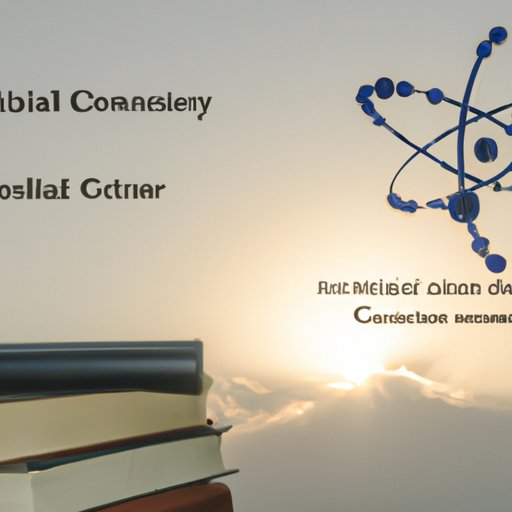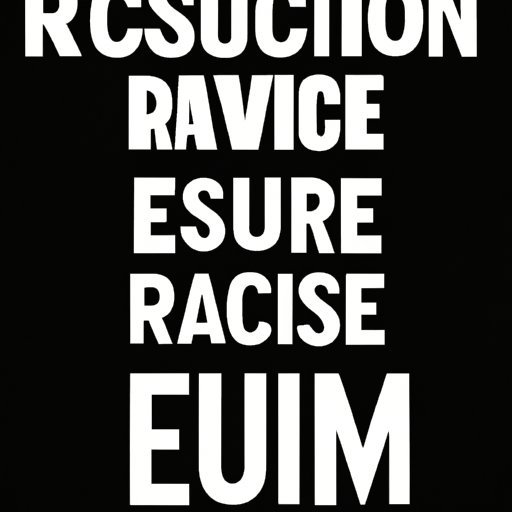Introduction
The debate between science and religion is one that has been ongoing for centuries. From the pre-modern period to the present day, there have been a variety of different perspectives on the relationship between science and religion. On the one hand, some view the two as fundamentally incompatible, while others argue that they are complementary. This article will explore the debate between science and religion, investigating different perspectives on faith and reason as well as the historical relationship between the two. It will also examine the role of popular culture in shaping how people perceive science and religion, and evaluate the impact of scientific discoveries on religious beliefs.

Examining Faith and Reason in the Context of Science and Religion
One way to approach the debate between science and religion is to consider the roles of faith and reason. In many religious traditions, faith is seen as an essential part of belief and practice, while reason is viewed as inferior or even antithetical to faith. As Pope Benedict XVI stated in his encyclical letter Spe Salvi, “Faith is not opposed to reason; it is only its higher form.” He went on to argue that faith and reason should be seen as complementary, rather than conflicting forces.
On the other hand, some argue that faith and reason are distinct and separate entities. For example, philosopher Bertrand Russell argued that “Religion is based, I think, primarily and mainly upon fear… Fear is the parent of cruelty, and therefore it is no wonder if cruelty and religion have gone hand in hand.” According to this perspective, faith and reason can be seen as oppositional forces, rather than complementary ones.
Exploring the Historical Relationship Between Science and Religion
The relationship between science and religion has changed over time. In the pre-modern period, science was largely seen as part of a larger religious worldview. For example, the ancient Greeks believed that the universe was governed by divine forces, and thus their scientific inquiries were often intertwined with religious beliefs. Similarly, in medieval Europe, theology was seen as the “queen of the sciences,” and scientific theories were often informed by religious teachings.
With the rise of modern science, however, the relationship between science and religion began to shift. Many of the new scientific theories challenged traditional religious beliefs, leading to increased tension between the two. This tension continued into the twentieth century, with scientists such as Stephen Hawking arguing that “science offers a more convincing explanation for the origins of the universe than religion.”
Analyzing the Interactions between Science and Religion in Popular Culture
Popular culture has played an important role in shaping how people perceive science and religion. Movies, television shows, and other forms of media often portray the two as being at odds with one another. For example, the 2008 film Angels & Demons portrays science and religion as being in conflict, with the protagonist struggling to reconcile his faith with his knowledge of scientific principles.
At the same time, popular culture has also helped to bridge the gap between science and religion. Films such as Contact (1997) and Interstellar (2014) show the potential for the two to coexist harmoniously. These films demonstrate that science and religion can be compatible if approached from an open-minded perspective.

Investigating the Potential for Reconciliation between Science and Religion
In recent years, there has been an increasing effort to reconcile science and religion. One approach is to focus on areas of common ground, such as morality or environmentalism. For example, the Pope’s 2015 encyclical letter Laudato Si argued for a joint effort between science and religion to address climate change.
Another approach is to emphasize the importance of dialogue between the two. Organizations such as the Science and Religion Forum promote conversations between scientists and theologians in order to foster understanding and cooperation. By engaging in respectful dialogue, it is possible to bridge the divide between science and religion.

Evaluating the Impact of Scientific Discoveries on Religious Beliefs
Scientific discoveries have had a profound impact on religious beliefs. In the past, scientific findings have challenged traditional religious teachings, leading to a crisis of faith for some believers. For example, the discovery of evolution led to a reevaluation of the biblical account of creation, and forced some to reconsider their understanding of God and the universe.
At the same time, scientific discoveries can also lead to a deepening of faith. For example, some Christians have argued that the Big Bang theory supports their belief in a Creator, since it suggests that the universe had a beginning. Others have argued that the complexity of life points to a Creator, since it implies that life must have been designed. By exploring these possibilities, believers can gain a deeper appreciation for the beauty and mystery of the universe.
Conclusion
The debate between science and religion has been ongoing for centuries, and there are a variety of different perspectives on the relationship between the two. While some view them as fundamentally incompatible, others argue that they can be reconciled through dialogue and common ground. Popular culture has played an important role in shaping how people perceive science and religion, and scientific discoveries have had a profound impact on religious beliefs. Ultimately, it is up to individuals to decide how to approach the debate between science and religion, and to find ways to bridge the divide between the two.
In conclusion, this article has explored the debate between science and religion, examining different perspectives on faith and reason as well as the historical relationship between the two. It has also investigated the role of popular culture in influencing how people perceive science and religion, and evaluated the impact of scientific discoveries on religious beliefs. It is clear that the debate between science and religion is complex and multifaceted, and further research is needed to better understand the relationship between the two.
(Note: Is this article not meeting your expectations? Do you have knowledge or insights to share? Unlock new opportunities and expand your reach by joining our authors team. Click Registration to join us and share your expertise with our readers.)
